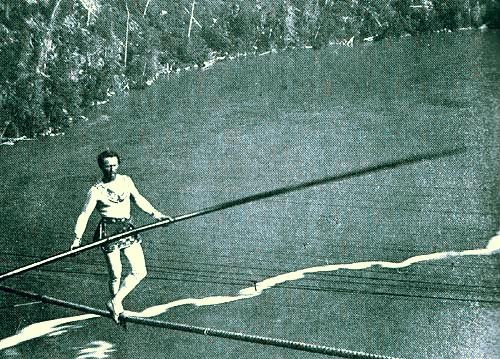Take Heed (December 2011 Tabletalk Article)
Bernard of Clairvaux once mentioned an old man who—upon hearing about any professing Christian who fell into sin—would say to himself, “He fell today; I may fall tomorrow.” The apostle Paul commended the same mindset when he wrote, “let anyone who thinks that he stands take heed lest he fall” (1 Corinthians 10:12). There is great wisdom in not trusting our own ability to stand. When I was a boy my father would often say, “The person I trust least of all is myself.” It should shock us to hear a professing Christian say, “I would never do that,” or “How could anyone do that?” The Scriptures record great sins of unbelievers and believers alike to instruct us in diverse ways. The former teach the unregenerate their need for the new birth. The latter teach the saints their need to distrust themselves. It is one thing to understand the sinful actions of unbelievers in Scripture; it is quite another to understand the sins of the saints. Consider the following:
If an innocent man could choose a piece of fruit over the infinitely valuable God (Genesis 3:6); If the most righteous man of his day could get so drunk that he passed out naked before his sons in his tent (Gen. 9:21); If the most faithful man of his day could father a child with his wife’s handmaiden (Gen. 16:1-4); If he could hand his wife over to other men–twice! (Gen. 12:11-15; 20:1-2); If the mother of promise could laugh at the words of the God of promise—and then lie to Him about doing so—(Gen. 18:9-15); If “righteous Lot” could greedily pick the most materialistic and sexually depraved place for he and his family to live (Gen. 13:8-13); if he could hand his daughters over to the sexually perverse men of the city (Gen. 19:4-8); if the son of promise could show partiality to his oldest son because he liked his hunting skills (Gen. 25:28); if he too could hand his wife over to another man (Gen. 26:6-11); if the namesake of Israel could swindle his brother for a birthright (Gen. 25:29-34)…so could I.
If the meekest man on the planet could act in such sinful anger and unbelief that God would not let him into the promised Land (Numbers 20:7-12); If his successor could disobediently covenant with pagans (Joshua 9); if two of Israel’s greatest judges could, in unbelief, doubt the immediate promises of God (Judges 4; 11); If the mighty man of valor could fall into idolatry at the end of his life (Judges 8:22-27); If the strongest man who ever lived could be defeated by wine and women (Judges 14-16)…so could I.
If the man after God’s own heart could commit adultery and premeditated the murder of one of his mighty men (2 Samuel 11); if the wisest man could foolishly allow his heart to be led astray by a thousand women to worship foreign gods (1 Kings 11); If the weeping prophet could charge God with deceiving His people (Jeremiah 4:10); if his penman could seek fame for helping him write his book (45:5); If the most evangelistically used Old Testament prophet could self-righteously run from the mission of God (Jonah 1-3)…so could I.
If the forerunner of Christ could doubt the identity of the One to whom he bore witness (Matthew 11:2-3); if the apostle Peter could try to stop Jesus from going to the cross (Matt. 16:21-23); could deny Jesus (Luke 22:54-61); could argue with the Lord about the Gospel and its implications (John 13:6-10; Acts 10:9-16); and, could support a division in the church over the doctrine of justification by faith alone (Galatians 2:11-21); if James and John could use Jesus to get to the top (Mark 10:35-37); if they could want to call fire down from heaven on those who did not believe the Gospel (Luke 9:51-55); and if the apostle John could fall down to worship Angels–twice! (Revelation 19:9-10; 22:8-9)…so could I!
We must resist the temptation of thinking we can stand in our own strength. We must depend on the grace of the One who said, “Apart from Me you can do nothing” (John 15:5). If we fall, we must go to Christ—confessing our sin and hoping in His mercy. The Scriptures declare: “The righteous fallsseven times and rises again” (Prov. 24:16). To fall seven times means that you have been restored six. The greatest believers are subject to great weaknesses. In no way do these truths give a license to sin; instead, they give a sober realization that “nothing good dwells in us.” We must distrust ourselves, bear with the weak, and hold fast to Christ. We must flee to our great High Priest, who was tempted in all points as we are—yet without sin. We must go to Him for grace and mercy to withstand temptations; and we must go to Him for grace and mercy if we fall. Since we are surrounded by so great a cloud of witnesses…let anyone who thinks that he stands take heed lest he fall.”




I continue to be very encouraged, inspired and convicted by Mr. Batzig’s teachings. I am very grateful for his very clear explanations of Scriptures. Thank you for using his teaching in Tabletalk.
Sincerely,
Nancy Johnson
Thanks Nick for this article. The simple application of Paul’s statement using the many Biblical examples of believers’ sins is very effective. The Lord helped you with this one.